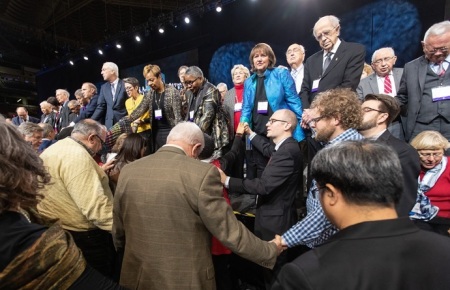United Methodist General Conference to have ‘queer clergy’ caucus at event

The United Methodist Church’s legislative meeting will have an unofficial caucus of LGBT-identified clergy advocating for changes in the denomination’s stance on homosexuality.
Known as the United Methodist Queer Clergy Caucus, the group will be present at the UMC General Conference, scheduled to take place April 23-May 3 at the Charlotte Convention Center in Charlotte, North Carolina.
On its website, the caucus identifies its members as “lesbian, gay, bisexual, transgender, queer, and intersex people who are called, commissioned, and ordained clergy in the United Methodist Church.”
At present, the UMC Book of Discipline prohibits the ordination of noncelibate homosexuals and bars clergy from blessing same-sex unions, emphasizing that homosexuality is “incompatible with Christian teaching.”
United Methodist Bishop Thomas Bickerton, who serves as president of the UMC Council of Bishops, told The Christian Post that past General Conferences have had similar caucuses.
“If you define an LGBT-themed caucus as any organization that actively lobbies to change the Discipline, then the answer is yes. There have been caucuses that have been organized. They've organized events, they've fought to advocate to organize delegates at General Conference to do that,” Bickerton explained.
“There's all sorts of caucuses that are formed, even though they may not be technically caucuses. Things like the United Methodist Association of Retired Clergy, or Mainstream United Methodist Church, which is advocating for changes in the Discipline.”
Bickerton also told CP that the caucus itself is not in violation of the Book of Discipline since “anyone can advocate for change on any matter” and “the majority of the petitions that are submitted to the General Conference call for some kind of change on some topic.”
“The restrictions on endorsing homosexuality have to do with what conferences and general agencies fund, not what various groups that are not a part of the structure of the United Methodist Church say or do or advocate,” he added.
Bickerton was referencing paragraph 613 in the Book of Discipline, which states that the UMC General Council on Finance and Administration will ensure that “no annual conference board, agency, committee, commission, or council shall give United Methodist funds to any gay caucus or group, or otherwise use such funds to promote the acceptance of homosexuality or violate the expressed commitment of The UMC ‘not to reject or condemn lesbian and gay members and friends.’”
Mark Tooley, president of the theologically conservative Institute on Religion and Democracy, told CP that he believes caucuses like the UMQCC “are becoming irrelevant as United Methodism fully adopts their agenda, which the 2024 General Conference undoubtedly will do.”
“Denominations are fading in importance,” Tooley said. “We are helping to preserve orthodox and Protestant teachings by stressing the great traditions even as the historic institutions fade.”
Over the past few decades, the UMC has been embroiled in a divisive debate over whether to change its rules prohibiting the ordination of clergy in same-sex romantic relationships and the blessing of same-sex unions.
Although efforts to change the rules at General Conference have always failed, many progressive leaders within the denomination have actively refused to follow or enforce the regulations.
Since 2019, approximately 7,500 congregations, mostly conservative, have left the UMC in response to the ongoing debate and the refusal of many progressive leaders to enforce the rules.
In addition to the many conservative churches that have left the UMC, the theologically conservative publication and advocacy group Good News will leave the denomination as well.
In an interview with CP in February, Good News President Rob Renfroe, who is currently a UMC elder, explained that the upcoming General Conference would be their final one.
"Good News has no desire to influence the policies or the future of the UMC," Renfroe said.
"That is very different from the past when we fought for a biblical view of marriage, high moral standards for ordained clergy, and a host of policies we believed would renew and reform the church.”





















